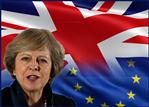
The U.K. is set for a 'hard Brexit', which implies a complete separation from the European Union, as Prime Minister Theresa May said on Tuesday that her country will not remain a member of the single market.
Britain will not seek to "hold on to bits of [EU] membership" and the country also will not seek to adopt models that are enjoyed by other countries, May said in a speech at the Lancaster House.
"Not partial membership of the European Union, associate membership of the European Union, or anything that leaves us half-in, half-out," she said as she laid out a 12-point 'Brexit' plan.
"We seek a new and equal partnership – between an independent, self-governing, Global Britain and our friends and allies in the EU," the British premier said.
The country will also not seek to remain in the single market, as it would "mean not leaving the EU at all", May said. However, the country will try to gain the "greatest possible access" to it.
May also said her government will seek a 'bold and ambitious' free trade agreement with the EU and would seek to remove all sorts of barriers possible to trade. The days of the UK making vast contributions to the EU will end, she added.
The British pound rallied as May spoke.
"I want this United Kingdom to emerge from this period of change stronger, fairer, more united and more outward-looking than ever before," May said.
"I want us to be a secure, prosperous, tolerant country."
The UK will also strike trade agreements with non-EU countries, May said, while pointing out that a full membership of the EU Customs Union prevents that. The prime minister said she had an open mind on how the customs agreement with the EU will be negotiated so as to keep cross-border trade tariff free and as friction-less as possible.
The UK will remain "the best friend and neighbor" to its European partners and the success of the union is important for the UK, May stressed. An unraveling of the EU is not in the interest of the UK, May added.
Calling Britain's culture "profoundly internationalist", May said her country was at times seen as an "awkward member state". She pointed out that the EU struggles to deal with the diversity of its members and their interests, saying the union "bends towards uniformity, not flexibility".
She termed her predecessor David Cameron's attempt to negotiate special status for the UK in the EU "a valiant final attempt", but said "there was not enough flexibility on many important matters for a majority of British voters".
In the referendum held on June 23 last year, about 52 percent of UK voters chose to leave the EU.
The final 'Brexit' deal agreed with the EU will be put to vote in both houses of the parliament, May confirmed. The government will convert the body of existing EU law, called the "acquis" into British law to provide maximum certainty to the country as it leaves the EU, the prime minister added.
She also said that the government cannot provide a blow-by-blow account of the negotiations as it would not be a disciplined approach and not in the interest of the country.
Given the divergent views among the devolved administrations on 'Brexit', May said her government will make effort to strengthen the bonds between Britain, Scotland, Wales and Northern Ireland during the negotiations.
May also said that 'Brexit' must mean getting a control of the number of people arriving in Britain from Europe. The government wants to guarantee rights of the EU nationals in Britain and those of Britons in other member states, as early as possible, she said.
One of the priorities would be to avoid a 'disruptive cliff-edge' situation for businesses after the separation from the EU, May said.
"I want us to have reached an agreement about our future partnership by the time the two-year Article Fifty process has concluded," she said.
"From that point onwards, we believe a phased process of implementation, in which both Britain and the EU institutions and member states prepare for the new arrangements that will exist between us will be in our mutual self-interest."
Further, May said it is an important priority to maintain the common travel area with Ireland and the government will seek a practical solution on the sharing borders.
by RTT Staff Writer
For comments and feedback: editorial@rttnews.com
Business News

